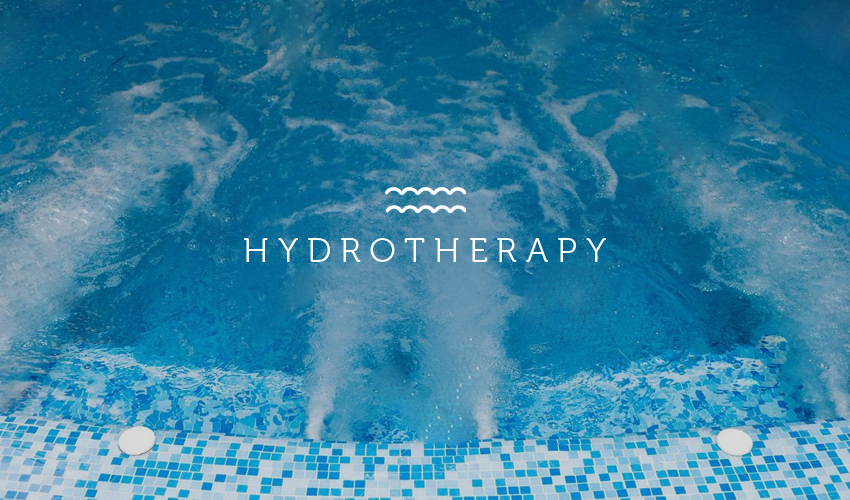Hydrotherapy
Medicinal Benefits of Hydrotherapy Water Therapies Improve Arthritis, Depression and More.
New studies show that hydrotherapy benefits patients rehabilitating from strokes, traumas, and other injuries as well as connective tissue diseases and asthma. Hydrotherapy refers to the medicinal use of water, including hot tubs, cold water treatments, ice packs, vapours, saunas, mineral springs, hot springs, sitz baths, wet towel applications, water exercises, and water massage. Hydrotherapy immersion waters available at spas may be rich in specific minerals or enhanced with aromatic oils or herbs. Many different forms of hydrotherapy are available.
It’s important to use the correct type of treatment since extremes of heat or cold and could be dangerous for some people.
Benefits of Hydrotherapy Hydrotherapy
Increases blood circulation, including circulation of the immune system’s white blood cells. Hydrotherapy also increases the body’s production of endogenous opioid peptides, particularly endorphins. Enhanced circulation and increased endorphins strengthen the immune system, reduce inflammation, heal injured tissue, improve well-being and energize the body.
Hydrotherapy also supplies fresh nutrients and oxygen to injured tissue and helps with the removal of waste products. In injuries alternate applications of heat and cold accelerate healing by improving blood vessel integrity and muscle tone. Heat causes peripheral (surface) blood vessels to dilate or expand. Cold causes peripheral blood vessels to constrict and drives blood back to the organs.
Conditions that Benefit from Hydrotherapy
Aids the rehabilitation process in injuries and stroke, and it improves respiratory infections. Hydrotherapy is also known to reduce pain and inflammation in arthritis and other rheumatologic conditions.
In addition, hydrotherapy reduces the effects of stress by increasing endorphin production, improves sleep, and prevents headaches. Hot tub hydrotherapy is also reported to improve blood sugar levels in patients with diabetes, lower blood pressure, and reduce symptoms in patients with multiple sclerosis, fibromyalgia, tendinitis, scoliosis, carpal tunnel syndrome and bursitis. Recent studies also show that cold water treatments, including swimming, are potentially effective treatments for depression and also offer pain relief. In patients undergoing strength training, hydrotherapy has also been found to improve recovery times.
Upper Respiratory Infections
Pneumonia In patients with upper respiratory infections, asthma, colds, influenza, bronchitis, and pneumonia, vaporizers, hot tub sessions, and saunas help to open airways and help white blood cells circulate to the affected areas, promoting healing and increasing respiration.
Rheumatoid arthritis
Patients with rheumatoid arthritis benefit from hot tubs, especially when used in conjunction with massage or water exercises. Hydrotherapy reduces joint pain by reducing inflammation and increasing blood flow. According to researchers at the National Center for Complementary and Alternative Medicine (NCCAM) at the National Institutes of Health, a small number of controlled studies have been done on hydrotherapy for rheumatoid arthritis, most based on sea-bath treatments given in Israel’s Dead Sea area. Most of these studies reported beneficial results. However, there have been quality issues noted with these studies, and it is not considered proven that the hydrotherapy itself provided the benefits for RA claimed in these studies. Larger and better studies are needed to answer this question. Study authors have noted that there could be other reasons for benefits, such as traveling to a spa, being removed from one’s daily routine, relaxation, socializing, and attitude.
Other:
- Arthritis
- Osteoporosis
- Repetitive motion injury
- Sports Injuries/Rehabilitation
- Orthopaedic surgery
- Back pain and shoulder pain
- Hip, knee, or ankle pain
- Brain or spinal cord injuries
- Bariatric care
- Amputations
- Lymphedema
- Prolonged inactivity/immobility
- Fatigue/weakness
- Fibromyalgia and other rheumatoid conditions
- Neurological disorders, including stroke, multiple sclerosis, and
- Parkinson’s disease
Precautions
The NCCAM reports that overall, hydrotherapy appears to be a low-risk practice for most people if common-sense precautions are taken, such as not exposing the body to too much heat or cold for extended periods, and drinking adequate fluid to prevent dehydration. However, hydrotherapy can pose risk for certain people including: People with a condition that could be worsened by exposure to extremes of heat or cold (for example, heart disease, lung disease, circulation disorder, Raynaud’s phenomenon, or chilblains) People with injuries that could be aggravated by strong motions from water jets People with difficulty perceiving temperature (for example, from neuropathy, or damage to the nerves) Women who are pregnant People who have implanted medical devices such as pacemakers or pumps
Scientific Evidence-Based Effects of Hydrotherapy on Various Systems of the Body
- Cardiovascular system
- Respiratory system
- Nervous system
- Musculoskeletal system
- Gastrointestinal system
- Genito urinary system
- Hematology/immunology
- Endocrine/hormonal system
- Eye, skin, and hair
- Temperature regulation

